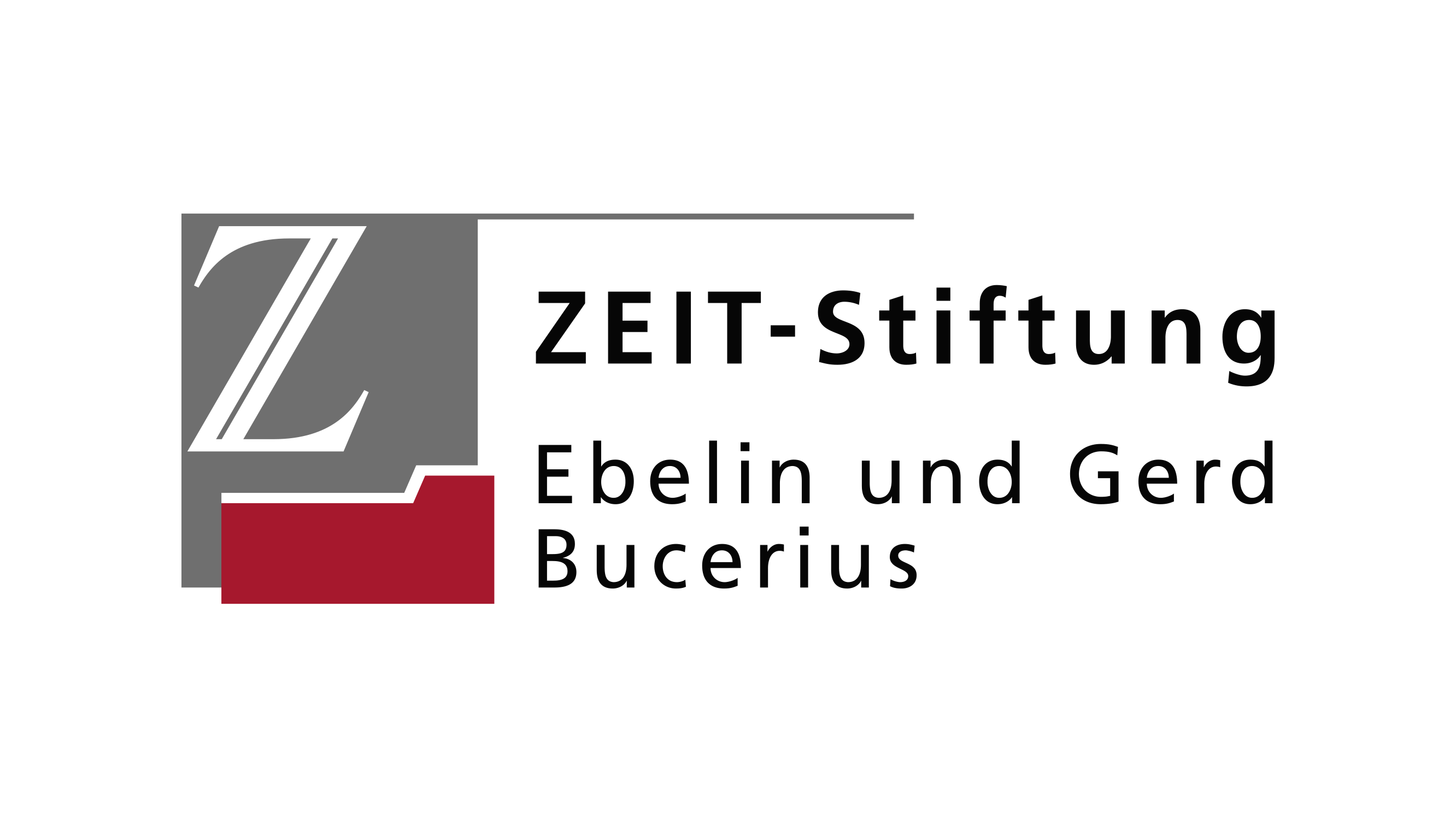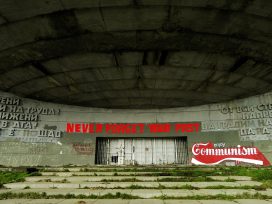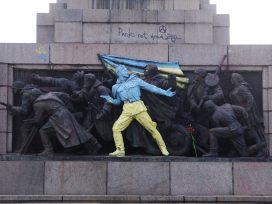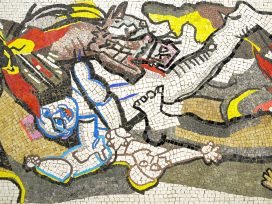North Macedonia: Democracy in the crosshairs
North Macedonia’s choice to support Ukraine has exposed it to intensified hybrid attacks. But internal divisions and festering disputes with neighbouring Bulgaria create a fertile ground for Russian interference, feeding existing resentment and a sense of encirclement.
Supporting democracy does not come cheap, but then again freedom is also costly. In Kherson, Bakhmut and Zaporizhzhia the cost is in human lives. In Europe it is in the rising electricity and utility bills. For North Macedonia, a small country in the middle of the Western Balkans, prices are not the only problem. The youngest NATO member, for the past several months especially, has faced textbook hybrid attacks intended to create fear, panic and distrust in state institutions.
Ever since the start of the war in Ukraine and the declared support of the Macedonian leadership for Kyiv, the country found itself on the Kremlin’s ‘naughty’ list, deemed by the Russian leadership as unfriendly. This act was unfortunately not considered too serious by the government or the Macedonian population.
200 bomb threats in three months
It all started in October 2022 with a bomb threat in one high school, something that does not regularly happen in North Macedonia. Two days later there were seven bomb threats in several high schools. Emails launching the alarm were sent via Proton Mail (an anonymous email service) and no one claimed responsibility. At the same time, the threats were not taken seriously. Almost everyone believed that it was probably the work of a teenager who was trying to avoid going to school.
Day by day, however, the threats continued. Schools were evacuated, parents were angry, and the capital Skopje was blocked by police and bomb squads, each time discovering that the threats were false. Journalists raised the issue of whether it was some kind of hybrid attack, but even then the politicians did not admit publicly that Russia was behind these events.
In the current political situation in North Macedonia, every moment of this saga is used for political gain in one way or another. The most fortunate development is that all of the reported bomb threats turned out to be hoaxes. There were even several arrests by the police. Some of those arrested were pursuing nothing more than publicity stunts, while some were just poor imitators.
The situation became more serious when, apart from high schools, bomb threats were made in primary schools and shopping centres. The peak came when in one day there were almost 50 reported bomb threats in schools, shopping centres, a TV station, the foreign ministry, and most notably the Skopje international airport, causing the entire capital to grind to a halt. On the same day, a bomb threat was even reported in one of the biggest hotels in Skopje ahead of a public event with the prime minister, Dimitar Kovachevski, and several members of his government.
In one of the emails the sender reportedly claimed that there were bombs in 23 locations and that threats would keep coming every day. The ending of the message was very clear: ‘We can continue to do this or you can lift the sanctions.’ This was when some politicians and experts went public in recognizing the hybrid attack and pointed the finger at Moscow.
The problem for North Macedonia in this regard is that even though the culprit is clear, there is little the country can do to prevent these hybrid attacks. This is largely due to the fact that the state IT and security infrastructure is underdeveloped and the attacks come from a foreign country which is bent on creating chaos, especially in the Western Balkans, a fertile ground for disruption.
Russian propaganda in North Macedonia
Why would Russia target North Macedonia, a country of no more than two million people with a small army? The country is a member of NATO, but also one of the main contributors per capita in terms of military hardware and assistance to Ukraine since the start of the war. Almost all of North Macedonia’s tanks and some combat vehicles were sent to Ukraine. Reports also indicated that the government sent five planes – which were coincidentally bought from Ukraine in 2001 – back to Kyiv. The assistance was recognized by Mikhail Podolyak, advisor to Ukrainian president Volodymyr Zelenskyy, who publicly thanked North Macedonia for the help in Macedonian.
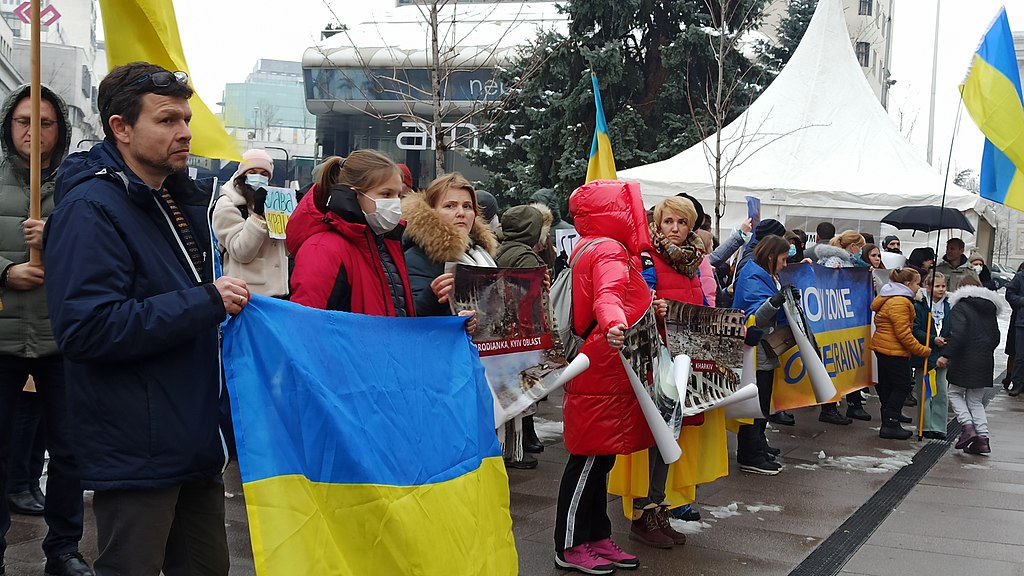
Demonstration in Skopje against Russia’s full-scale invasion of Ukraine. Photo by M4r51n via Wikimedia Commons.
Meanwhile, Russian Telegram channels almost regularly reported videos of destroyed Macedonian tanks and equipment, without any proof that they were in fact Macedonian. Yet, since the main task of Russian propaganda is to sow discord, it set to work. One video apparently showed Macedonian military equipment sent to Ukraine via a train. The video went viral even though it was later disproven and geo-located in Belarus. Videos like this were widespread on social media, encouraging many to ask: why is North Macedonia sending tanks to be destroyed in Ukraine, and getting nothing in return?
This was a difficult question for some to answer, especially considering the amount of fake news being spread since the start of the war. Some politicians in the ruling coalition tried to explain that while North Macedonia is a member of NATO and Ukraine is not, the two countries share many similarities and that their fight is ours as well.
Both Macedonians and Ukrainians had and still have their national identities denied by other nations. Both countries have been part of the communist Bloc in the past and now want a clear European perspective. They have historical, linguistic and even religious issues with their neighbours. The Ukrainian people suffer the same discrimination and denial as Macedonians. And even though this might be a sufficient reason for most Macedonians to condemn Russia and support Ukraine, it somehow was not enough.
The problem here is not just Russian propaganda, but also the incapability of institutions to deal with it. Most importantly, the fault lies with the political parties. The ruling coalition publicly supports Ukraine, but they currently have bigger issues to deal with: rising energy bills and food prices, and above all the desire to stay in power.
For some political parties, especially the ones in opposition, the narrative that is most commonly used is that North Macedonia is a small country with a lot of problems, and that Ukraine should not be at the very top of the list of priorities. This is harmful in the sense that it deepens the divide in a country that has rarely been united.
Russian manipulation of the dispute with Bulgaria
North Macedonia is not an EU member, and NATO membership came at a price. The country known to its citizens simply as ‘Macedonia’ acquired the prefix ‘North’ after the 2018 Prespa agreement with Greece. All public monuments were re-christened, names of public institutions changed and even birth certificates are different now. Suffice to say that many Macedonians find the new name derogatory.

The Museum of the Macedonian Struggle and the National Theatre in Skopje. Photo by Pudelek via Wikimedia Commons.
While all of this was happening, the Russian embassy in North Macedonia kept using the old name. On social media, it referred to its ‘brotherly people’ as Macedonians. NATO accession was noted by the Kremlin, but not taken too seriously. In the country, Russia was not seen as a potential threat, even though on the eve of the constitutional amendments for the changing of the name there were protests in Skopje by two pro-Russian political parties, the leader of one carrying a Russian flag on top of an armoured vehicle. Unfortunately, this was not interpreted as foreign influence or hybrid warfare by the public.
North Macedonia is not yet a member of the European Union, and this is where malign influence has been most detrimental. It started with a veto from Bulgaria in the Council of the EU to block the start of membership negotiations. The dispute with Bulgaria is deep and goes back to the end of the Second World War, but the veto proved to be the perfect opportunity for Moscow to employ disinformation and fake news to sow doubt in the EU and NATO.
One example involves holidays and national heroes. The Russian embassy in Skopje would celebrate a public holiday, calling it ‘Macedonian’ on social media, while the embassy in Sofia would do the same but calling it ‘Bulgarian’. A cheap trick, easily discoverable, but not for the average person who consumes information primarily on social media and who wants to believe whatever reinforces their existing predispositions.
In a recent poll conducted by the International Republican Institute in North Macedonia, support for EU membership has fallen by 11 per cent compared to last year. Serbia is now regarded as the most favourable partner and the EU is second, a drastic change from just two years ago, when Brussels was seen as the primary partner. Most strikingly, Nikola Gruevski – the former prime minister who escaped to Hungary in 2018 thanks to Viktor Orbán and was convicted in North Macedonia for money laundering in 2022 – is viewed as the most popular politician, even though he is on the US blacklist and is still wanted for serious crimes in North Macedonia.
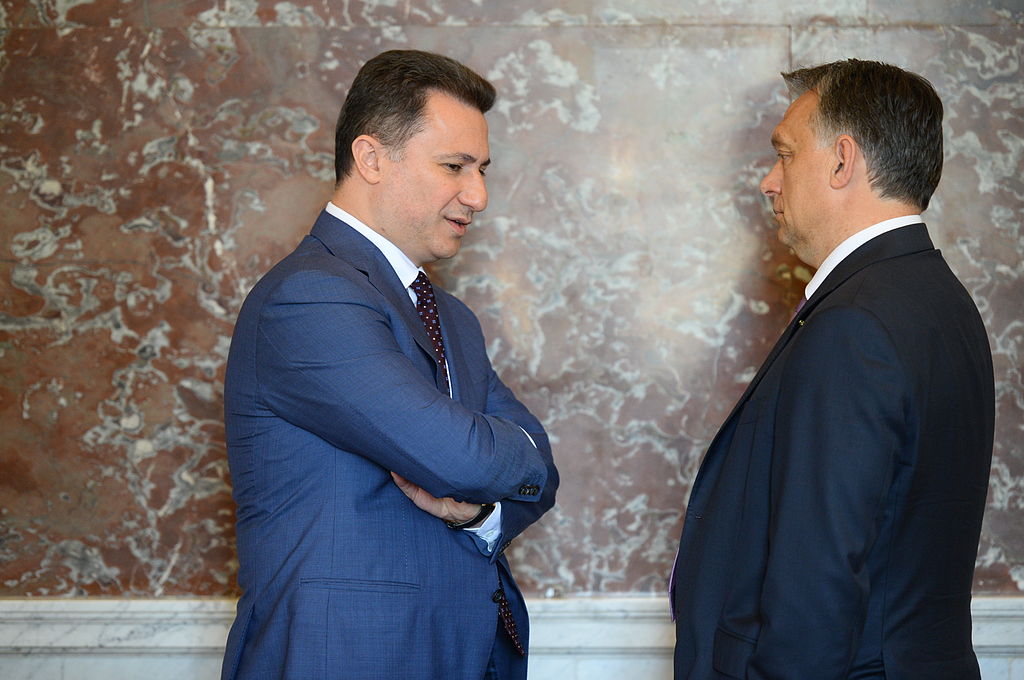
EPP Summit, Brussels, June 2015; Viktor Orbán and Nikola Gruevski. Photo by the EPP via Wikimedia Commons.
The findings from the poll are not only the result of interference from Moscow, but also of Brussels’ failure to help resolve the issue with Bulgaria and fast-track the accession negotiations.
Dangerous rhetoric
The dispute with Bulgaria worsened when the Bulgarian president, Rumen Radev, summoned his national security council for consultations regarding the protection of Bulgarians living in North Macedonia. The divisive discourse between Skopje and Sofia was fuelled by Bulgarian politicians like Radev but also Kostadin Kostadinov, the leader of the far right ‘Revival’ party and a pro-Russian politician who openly denies the existence of the Macedonian nation and language. His political party won ten per cent of the national vote in the last elections thanks mostly to its pro-Russian, anti-EU and anti-American rhetoric. He and other Bulgarian politicians claim that Macedonians are a communist invention created by Lenin and Tito – a claim that is not only offensive, but dangerous in the long run.
On the other hand, in North Macedonia there is the political party ‘Left’, led by Dimitar Apasiev, who even publicly met with the Russian ambassador in Skopje several times, but never with his Ukrainian counterpart. Apasiev openly advocates for the country to withdraw from NATO and join the Chinese ‘Belt and Road’ initiative.
This kind of rhetoric from both sides of the border is being used and amplified by bots on social media to fuel resentment towards the EU and NATO. The narrative they most commonly use in North Macedonia is that Brussels will always protect Bulgaria because it is a member state, and that every other neighbour is also hostile.
All in all, the war in Ukraine is raging in the Balkans as well, only not by military means, but with disinformation on social media, hacker attacks and fake news. Russia’s hybrid war against the West has found fertile ground in the region and amongst states that, despite their clear Euro-Atlantic orientation, are vulnerable.
For North Macedonia, the path since independence was clear: its future is in NATO and the EU. The first goal was reached several years ago, the second is still a work in progress. After all the sacrifices made, perhaps not even malign Russian influence can prevent that from happening.
Published 17 March 2023
Original in English
First published by New Eastern Europe 1/2023
Contributed by New Eastern Europe © Jovan Gjorgovski / New Eastern Europe / Eurozine
PDF/PRINTPublished in
In collaboration with
In focal points
- Living dead democracy
- Why Parliaments?
- Spelling out a law for nature
- No more turning a blind eye
- The end of Tunisia’s spring?
- Protecting nature, empowering people
- Albania: Obstructed democracy
- Romania: Propaganda into votes
- The myth of sudden death
- Hungary: From housing justice to municipal opposition
Newsletter
Subscribe to know what’s worth thinking about.
Related Articles

The sharp drop in support for Ukraine in Italy has less to do with the traditionally Russia-friendly economic policy of the Italian right, and more with the anti-Americanism rooted in the political culture of the Italian left, which now articulates itself as pacifism.

Our dear friends in Moscow
An interview with Irina Borogan and Andrei Soldatov
Putin’s crack-down on dissent at the beginning of his third term was a watershed moment for Russian journalism. While the majority of critical reporters were forced to leave, those that remained morphed into regime propagandists. How to explain their political subservience?
